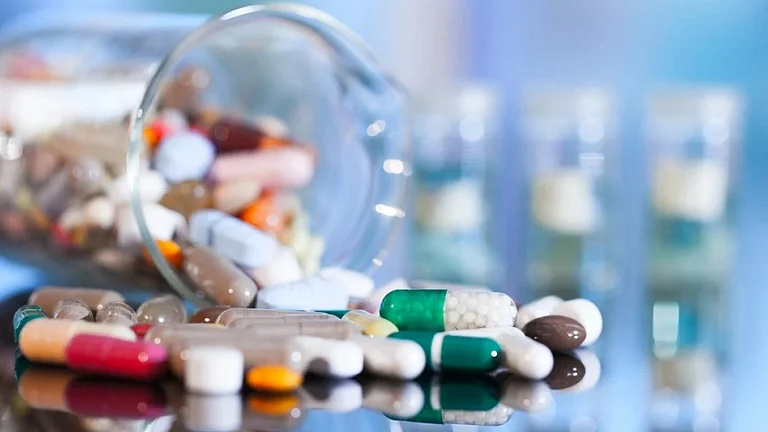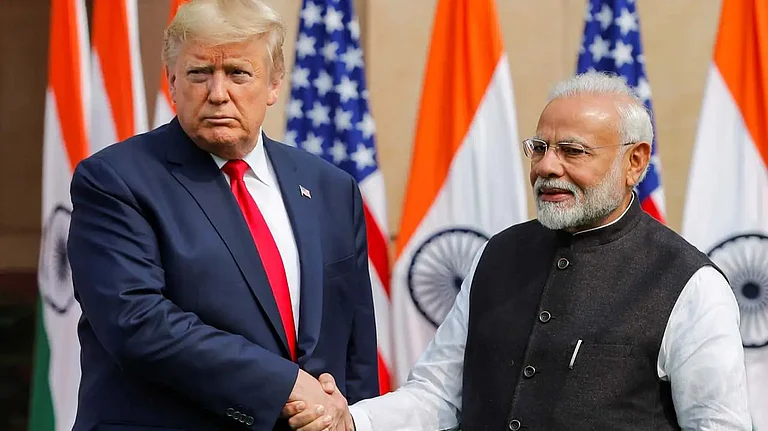Trump announced a 100% tariff on branded and patented drugs from October 1, 2025.
The social media post on Truth Social sparked concerns among Indian investors, as pharma stocks plunged.
However, analysts say the announcement is “incomplete” and “ambiguous.”
Uncertainty remains over whether complex generics and specialty medicines are covered.
Why Trump’s ‘Ambiguous’ 100% Tariff May Not Hurt Indian Pharma Cos
“Considering the complexity of global supply chains, the tariff announcement is incomplete. We believe pharma companies can avoid tariffs by announcing capex, M&A, or partnerships in the US,” Nuvama analyst said
US President Donald Trump on Friday (Indian time) announced 100% tariffs on branded or patented drugs, sending fresh shock waves among trade partners, especially India, which exports a third of its pharmaceutical products to the US. Following the announcement, shares of Indian pharma companies fell as much as 4% in early trade.
However, analysts say the announcement appears “incomplete” and “ambiguous”, and Indian companies may be able to avoid tariffs with relative ease. Many firms have already begun preparing for such a scenario after Trump’s earlier threats.
“Starting October 1st, 2025, we will be imposing a 100% tariff on any branded or patented pharmaceutical product, unless a company is building its manufacturing plant in America. ‘Is building’ will be defined as ‘breaking ground’ and/or ‘under construction’. There will, therefore, be no tariff on these products if construction has started,” Trump wrote on his Truth Social page.
While Trump clarified that companies with plants under construction in the US would not face tariffs, Shrikant Akolkar, Vice President of Equity Research at Nuvama Institutional Equities, noted: “This creates confusion about tariffs on branded pharma.” He added that Trump had only weeks earlier announced 15% tariffs on branded drugs manufactured in Europe, and the new statement does not clarify the treatment of APIs, fill-finish products or devices.
“Considering the complexity of global supply chains, the tariff announcement is incomplete. We believe pharma companies can avoid tariffs by announcing capex, M&A, or partnerships in the US,” Akolkar said.
According to analysts Maitri Sheth, Deepika Murarka and Stuti Bagadia at Choice Institutional Equities, while the tariff primarily targets branded drugs, there is ambiguity over whether complex generics and specialty medicines could also be affected. This could pose challenges for companies heavily dependent on US exports.
They noted, “The 100% US tariff on branded and patented pharmaceutical products could negatively impact Indian pharmaceutical exporters, as the US represents the largest market for Indian pharma, accounting for approximately 35% of exports worth $10 billion in FY25. However, companies with US manufacturing plants under construction will be exempt, offering a way to mitigate tariff exposure.”
US Dependence on Indian Pharma
India’s pharma exports to the US stood at $8.1 billion in FY24, while imports from the US to India were just $400 million. The US relies on India for about 45% of its generic drug supplies and 10–15% of biosimilars by volume.
According to a white paper by the API Innovation Center, 83 of the top 100 generics prescribed in the US have no domestic API source. API production in the US has declined 61% over the past decade, while India and China have expanded capacities.
Kotak Institutional Equities noted in April that while the US generics market represents less than 10% of the $600 billion US pharma market by value, American patients would face higher drug costs if tariffs were imposed. Earlier, the Trump administration had also announced 26% reciprocal tariffs on India and warned pharma companies to either lower US drug prices to their global minimum or raise prices overseas.
“If tariffs are not rolled back, pharma companies may be forced to prune their US portfolios—or even exit entirely—after trying options such as passing on higher costs. Distributors and payors in the US may also bear part of the burden,” Kotak warned at the time. Others have echoed concerns that tariffs on pharmaceuticals would ultimately hurt American patients, as companies would pass on additional costs.
How Exposed Are Indian Pharma Companies?
Indian pharma firms derive 40–50% of their total revenue from the US. An SBI Research report last month estimated that tariffs could hit 5–10% of FY26 earnings.
Exposure levels vary widely. Syngene earns 68% of its revenue from the US, Gland Pharma 54%, Biocon 50%, Zydus Life 45%, Dr Reddy’s 43%, Piramal Pharma 41%, and Lupin 35%. Sun Pharma (30%), Cipla (28%), Alkem (20%), and Laurus Labs (17%) are also significantly exposed.
The market reflected these risks, with the Nifty Pharma index down 2.23% to 21,487 at noon. IPCA Labs and Torrent Pharma managed small gains, but Laurus Labs plunged 7.44%, Natco Pharma fell 4.92%, Biocon 4.4%, Zydus Life 3.38%, Sun Pharma 2.88%, Glenmark 2.74%, Divi’s Labs 2.55%, Gland Pharma 2.33%, Granules India 2.17%, Lupin 1.88%, Mankind 1.79%, Dr Reddy’s 1.24%, Alkem 1.1%, and Cipla 0.87%.
Nuvama analysts highlighted that among their coverage, Sun Pharma ($1.1 billion innovative medicines revenue in FY25), Biocon ($450 million branded biosimilars), and Aurobindo Pharma ($100 million branded oncology drugs) have the highest exposure to US branded medicines.
But they added that Sun Pharma’s flagship drug Ilumya is manufactured in South Korea and Europe, limiting tariff exposure. Biocon, which manufactures insulin in Malaysia and biosimilars in India, may face greater challenges as insulin is a high-volume category. However, Biocon’s Syngene unit acquired a biologics facility in Baltimore in March 2025, which could mitigate risks. Aurobindo already manufactures branded oncology drugs in the US and, following its acquisition of Lannett, owns a US plant.
Akolkar also pointed out that Jubilant Pharmova’s new fill-finish line in Spokane, due in H2FY26, is already attracting strong demand, while a fourth CDMO line is planned for FY28. Zydus Lifesciences is expanding in the US biologics CDMO space with a $141 million acquisition of two Agenus units, while Alkem Labs and Piramal are also building or operating facilities in the US.
According to a Kotak analysis in August, only Mankind, Natco and Zydus lacked a US base at the time. Zydus has since acted to secure capacity, and analysts say other companies could follow through partnerships or acquisitions.

